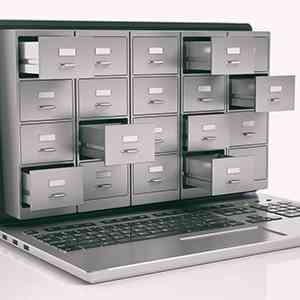
With technology advancing and altering daily activities, e-filing replaces traditional paper filing. Integrated e-filing changes how documents are processed and dispatched, meaning it will proceed faster than conventional methods. It also ensures that individuals', companies', and legal matters information is safe and secure with the system.
The use of e-filing eliminates most paperwork. For example, filing taxes, presenting legal documents, and managing records in a business becomes easier and faster. This helps to set the context for e-filing by explaining why it is now featured more and more in today’s society and the benefits that it means for filing. In addition, it is eco-friendly as it reduces the use of paper and ink in the production of the newspaper.
Read this article until the end to explore how you can embrace technological advances, particularly with the rise of e-filing.
The Change from Paper to DigitalFor many years, paper filing was the standard method for managing documents. However, this system had several limitations. Paper documents could be easily lost, damaged, or misplaced, and accessing specific information often requires considerable time and effort. Moreover, the environmental impact of using vast amounts of paper was a significant concern.
With the rise of digital technology, e-filing emerged as a solution to these issues. E-filing allows users to submit and manage documents electronically, reducing the need for physical storage and making organizing and retrieving files more accessible. This transition from paper to digital has led to more efficient processes, saving time and resources while being environmentally friendly.
- ZimStats intensifies census awareness campaigns
- Building Narratives: WaMagaisa: The ink that connected the dots
- Building Narratives: WaMagaisa: The ink that connected the dots
- Documentation boon for San community
Keep Reading
Advantages of E-Filing
E-filing offers numerous benefits, making it a preferred option for many organizations and individuals.
Time-SavingE-filing significantly reduces the time required to submit and process documents. Instead of manually handling paperwork, users can file documents electronically within minutes. This is especially beneficial for businesses and legal professionals who handle large amounts of paperwork.
Cost EfficiencyE-filing reduces costs associated with printing, storing, and mailing paper documents. Businesses can save money by minimizing the need for physical storage and reducing expenses related to postage and printing.
Improved SecurityPaper documents are vulnerable to loss, theft, and damage. E-filing systems offer enhanced security features such as encryption and secure access controls, ensuring that sensitive information is protected.
Environmental BenefitsE-filing contributes to environmental conservation by reducing the need for paper. It helps lower the demand for paper production, reducing deforestation and the ecological footprint of paper use.
Accessibility
E-filing allows users to access and manage documents from any location with an internet connection. This convenience is particularly valuable for individuals who must submit forms or access records away from the office.
E-Filing in the Legal Sector
The legal sector has been one of the leading adopters of e-filing, recognizing its potential to streamline legal processes and improve efficiency. For instance, professional and experienced bail bond companies like Fianzas, located in Florida, have integrated e-filing into their operations to facilitate the timely submission of legal documents. This shift has made it easier for clients to manage bail bond paperwork electronically, reducing delays and errors associated with traditional filing methods.
E-filing has also revolutionized court systems, allowing legal professionals to electronically submit documents such as motions, pleadings, and briefs. This saves time and helps ensure that documents are filed within deadlines. For some instances, many courts now mandate e-filing, underscoring its importance in modern legal practice.
E-Filing in Taxation
Another area where e-filing has gained widespread acceptance is taxation. Filing taxes can be daunting, but e-filing simplifies the process by guiding users through each step and ensuring that all required information is provided. E-filing systems also include error-checking features, helping to reduce the likelihood of mistakes that could lead to audits or penalties.
Tax agencies worldwide have embraced e-filing to improve the accuracy and efficiency of tax returns. In the United States, for example, the Internal Revenue Service (IRS) encourages taxpayers to file electronically, offering benefits such as faster refunds and instant confirmation of receipt. E-filing has become the norm for many taxpayers, making filing taxes more straightforward and less time-consuming.
E-Filing in Business Operations
Businesses of all sizes increasingly turn to e-filing to manage a wide range of documents, from regulatory filings to internal records. By adopting e-filing, companies can streamline their operations and reduce the time and resources required to handle paperwork.
For instance, companies can use e-filing to submit annual reports, financial statements, and other regulatory documents to relevant authorities. This ensures compliance with legal requirements while minimizing the risk of errors or missed deadlines. Additionally, e-filing can be integrated with a company’s document management system, making it easier to organize, store, and retrieve essential records.
Addressing the Challenges of E-Filing
While e-filing offers many benefits, it also presents specific challenges that must be addressed.
Digital DivideOne of the primary concerns is the digital divide. Only some have equal access to technology or the internet, which can create barriers for individuals or businesses that rely on traditional filing methods. To overcome this issue, efforts must be made to improve access to technology and provide support for those transitioning to e-filing.
Data SecurityAnother consideration is data security. Although e-filing systems offer robust security features, they are not immune to cyber threats. Organizations must implement strong cybersecurity measures to protect sensitive information from unauthorized access or breaches.
Changing MindsetsFinally, transitioning from paper to e-filing requires changing mindsets and practices. Organizations must invest in training and education to ensure employees are comfortable with and understand how to use the new systems effectively.
Final Thought
E-filing significantly advances document management and legal process management. By embracing this technology, individuals and businesses can save time, reduce costs, and enhance efficiency.
However, to ensure everyone can benefit from this innovation, it is essential to address the challenges associated with e-filing, such as the digital divide and data security. As the world moves towards a more digital future, e-filing is set to play a crucial role in streamlining operations and improving access to essential services.











